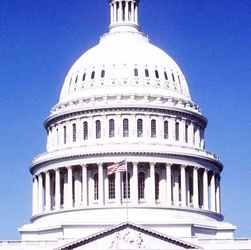 President Obama's proposed fiscal-year 2012 budget reflects his administration's focus on promoting renewable energy, but these goals are at odds with those of the 112th U.S. Congress, which began work this year with intensive deficit-reduction weighing heavily on its collective mind.
President Obama's proposed fiscal-year 2012 budget reflects his administration's focus on promoting renewable energy, but these goals are at odds with those of the 112th U.S. Congress, which began work this year with intensive deficit-reduction weighing heavily on its collective mind.
Obama has defended his budget, released this week, as capable of putting the U.S. on a ‘fiscally sustainable path’ – while serving to advance renewable energy. His proposal would increase the U.S. Department of Energy's (DOE) budget to $29.5 billion, an 11.8% increase over the level appropriated for fiscal-year 2010.
Specific allocations include $5.9 billion to basic science and the Advanced Research Projects Agency – Energy (ARPA-E), $291 million to support ‘innovative and advanced’ energy technology credit programs, and $4.8 billion to energy supply and energy efficiency programs. A total of $300 million in credit subsidies would be made available to support approximately $3 billion to $4 billion in renewable energy and energy efficiency projects.
‘We are eliminating subsidies to fossil fuels and instead making a significant investment in clean energy technology – boosting our investment in this high-growth field by a third – because the country that leads in clean energy will lead in the global economy,’ Obama said in a recent statement addressing the budget. He also reiterated his national goal of 80% clean energy by 2035.
Although the clean energy goal may garner widespread bipartisan support, the increases in spending, as well as his cuts to the Fossil Energy Office – to the tune of 45%, or $418 million – to pay for clean energy investment have already been met with resistance.
Under the best-case scenario, the DOE's funding and allocations for renewable energy would be kept at their current levels in the version of the budget that is approved, Salo Zelermyer, an associate in the Environmental Strategies Group at law firm Bracewell & Giuliani, told North American Windpower's sister publication Solar Industry. More likely, however, the agency will see decreased levels of funding once the president, the House and the Senate complete their budget negotiations over the next few months.
Meanwhile, the continuing resolution (CR) announced by the House Appropriations Committee is the first in U.S. history to contain spending reductions. Perhaps most troubling, the DOE's loan-guarantee program, widely considered a crucial slice of the project-finance pie, would see its funding significantly reduced.
Under Section 1425 of the CR, ‘the total principal amount for commitments to guarantee loans for eligible projects (other than nuclear power facilities and front-end nuclear facilities) under the heading 'Department of Energy, Title 17 Innovative Technology Loan Guarantee Authority Loan Program,' in title III of division C of Public Law 111-8, is hereby reduced by $25,000,000,000.’
The CR is expected to be debated by the House this week, according to an announcement from Speaker of the House John Boehner, R-Ohio.
Zelemyer anticipates that the CR may pass the Republican-majority House. However, he believes its chances of becoming law – in its current form – are low, given the Democratic-majority Senate, public denouncements of the legislation from Sen. Harry Reid, D-Nev., and Rep. Nancy Pelosi, D-Calif., and Obama's veto power.
‘What the president's budget is illustrative of is where the White House sees its priorities for the coming year,’ he points out.
Accordingly, he predicts that although the DOE loan-guarantee program may see cuts this year, any plans for its complete elimination, or the dramatic reductions proposed in the CR, will be swiftly shot down by the administration.



